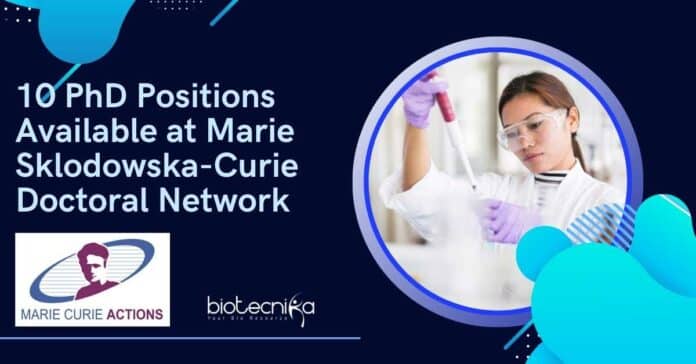10 PhD Positions Available at Marie Sklodowska-Curie Doctoral Network
Ten PhD positions are available in the Marie Sklodowska-Curie Doctoral Network “Chrom_rare: Unveiling the molecular basis of chromatinopathies to delineate innovative therapeutic solutions”. Chrom_rare has been conceived to decipher how pathogenic variants of essential chromatin regulators impact on both the genetic and non-genetic function of the genome and lead to diseases featuring the dysfunction of chromatin, which are collectively referred to as chromatinopathies. Addressing this question will further strengthen our understanding of the basic biology of the cell nucleus and help thereby determining the potentially druggable phenotypic features of chromatinopathies. Chrom_rare is a consortium of high-profile universities, research institutions and companies located in Italy, Spain, France, Germany, Poland, the Netherlands, and UK.
Chrom_rare will set-up an intra-sectoral, cross-disciplinary training programme that would prepare the next generation of researchers equipped with advanced theoretical, technical and computational skills to study fundamental aspects of chromatin biology and their impact on chromatinopathies.
The following PhD projects are available:
Host supervisor: Prof Alessio Zippo – University of Trento
DC2: Characterizing cortical neurons in Kabuki syndrome to understand biology and identify therapeutic targets
Host supervisor: Prof Siddharth Banka – The University of Manchester
DC3: Epigenome and transcriptome in depth analysis of patient-derived model for
CPs, mapping of possible alterations and effects of epi-drugs on the profiles
Host supervisor: Prof JeanChristophe Andrau – University of Montpellier
DC4: Computational modelling of epigenome rewiring (walking pathways) during cell
differentiation. Model validation by in depth analysis of epigenome and
transcriptome data
Host supervisor: Prof Alexandre Kel – Genexplain GMBH
DC5: Enhancer responsiveness in disease models of Cornelia de Lange (CdL) and
Wiedemann-Steiner (WDST) syndromes
Host supervisor: Prof Alvaro Rada Iglesias -Agencia Estatal Consejo Superior de
Investigaciones Cientificas
DC6: Genotype/phenotype and epi-genotype correlations, immune phenotype in CPs
Host supervisor: Prof David Geneviéve – Centre Hospitalier Universitaire
DC7: Defining the molecular consequences of haploinsufficiency in CEBP and p300
histone acetyltransferases underpinning the RT syndrome
Host supervisor: Prof Pękowska, – Instytut Biologii Doswiadczalnej IM. M. Nenckiego
Polskiej Akademii Nauk
DC8: Biobanking, DNA-methylation signature and 3D genome organization in the study of Kabuki syndrome – UNINA
Host supervisor: Prof Giuseppe Merla – University of Naples Federico II
DC9: Defining the proximal proteome of mutant chromatin proteins associated with CPs
Host supervisor: Prof Michiel Vermeulen – Stichting Radboud Universiteit
DC10: Dissecting alterations of nuclear compartmentalization in CPs: from LLPS to
molecular dynamics
Host supervisor: Prof Alessio Zippo – University of Trento
Benefits
Successful candidates will be part of an international and interdisciplinary network.
- Chrom_rare fellows will be employed according to the rules for Doctoral Candidates in MSCA DNs and the general regulations of each host institution.
- The financial package will include the three-monthly researcher allowances: 1) Living allowance of €3,400 (country correction coefficient applies), 2) Mobility allowance of €600, 3) Family allowance (€660), if applicable.
The guaranteed PhD funding is for 36 months. In addition to their individual scientific projects, all doctoral candidates will benefit from further continuing education, which includes internships and secondments, a variety of training modules as well as transferable skills courses and active participation in workshops and conferences.
Skills/Qualifications
- Supported researchers must be Doctoral Candidates (DC), i.e., not already in possession of a doctoral degree at the date of the recruitment. Researchers who have successfully defended their doctoral thesis but who have not yet formally been awarded the doctoral degree will not be considered eligible
- Recruited researchers can be of any nationality and must comply with the following mobility rule: Researchers are required to undertake trans-national mobility (i.e., move from one country to another) when taking up the appointment. At the time of selection by the host organization, researchers must not have resided or carried out their main activity (work, studies, etc.) in the country of their host organization for more than 12 months in the 3 years immediately prior to their recruitment. Short stays, such as holidays, are not taken into account.
- English language: Candidates must demonstrate that their ability to understand and express themselves in both written and spoken English is sufficiently high for them to derive the full benefit from the network training.
Selection process
Our selection procedure is open, transparent, merit-based and in line with the Code of Conduct for the Recruitment of Researchers.
Candidates shouldsubmit the following documents as one single PDF file for one to maximum three positions and indicate their preference.
- A detailed CV
- A motivation letter (max 1 page)
- 2 reference letters
- A project proposal (max 2 pages)
When uploading the file in the application section, it is required to upload a single file in .pdf format containing all the information previously requested
We will choose the candidates that fit the most in the different projects in the following steps:
· Eligibility check: our recruitment committee will check that each application is complete and that applicants fulfil the eligibility criteria described in the previous section.
· Remote Evaluation: each eligible application will be assessed independently by the principal investigators of our network, according to the project interests indicated by the applicants. The principal investigators will select up to four candidates per position to pass through to the following stage.
· Online interviews: short-listed candidates will be invited for an online interview. Those who have been positively evaluated but not initially called for interviews will be put on a reserve list. Short- listed candidates will be interviewed by their potential supervisor (i.e. the supervisor responsible for the research project of interest), two additional supervisors from the network, and a member of the recruitment committee.
· Notification of the selection outcomes: our recruitment committee will notify short-listed candidates of the outcome.
· Applicants who have not been successful but who have received a positive evaluation will be put on a waiting list to cover possible renunciations and future positions.
Recruitment Calendar
- Call opening: February 2023
- Deadline for applications: April 30th, 2023
- Remote evaluation: May10th – 24th, 2023
- Interviews: June 2nd – 5th, 2023
- Notification to candidates: June 9th, 2023
- Start date of the fellowship: July – November 2023
Editor’s Note: 10 PhD Positions Available at Marie Sklodowska-Curie Doctoral Network. 10 PhD Positions Available at Marie Sklodowska-Curie Doctoral Network. 10 PhD Positions Available at Marie Sklodowska-Curie Doctoral Network. Please ensure you are subscribed to the Biotecnika Times Newsletter and our YouTube channel to be notified of the latest industry news. Follow us on social media like Twitter, Telegram, Facebook































